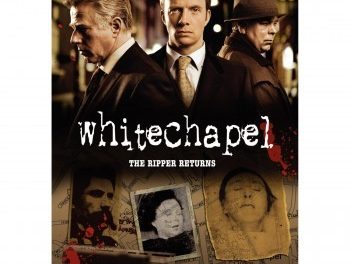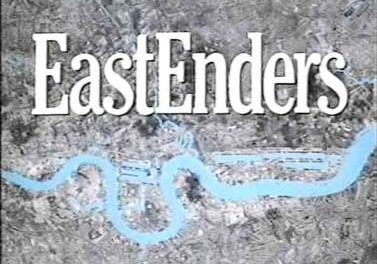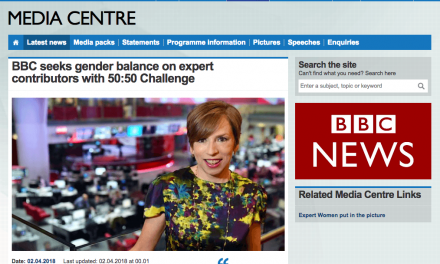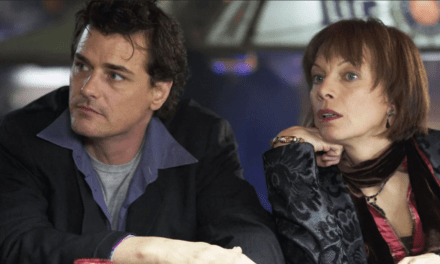I passed my viva! Hurrah! Good, now that’s out of the way, let’s talk about Channel 4 Comedy commission Catastrophe, which is currently airing its second series, less than a year after its first went out in January of 2015. And let’s also get something else out of the way: the total agreement I am in with the majority of TV critics about its being utterly brilliant. Good. That’s done too.
Fitting perhaps, given the subject of this blog, that I’m writing from California, land of five-dollar hemp milk cappuccinos and 9-dollar craft beers (which is just real ale but a bit colder and fizzier). With my current locale in mind, I am going to discuss here the way in which the transatlantic-ness of particular contemporary television comedies is a site as yet untapped for analysis in the construction of such comedy’s ‘quality’ status and cultural value. While there is a long history of British and American comedies, their formats and occasionally their talent base, moving back and forth over the ocean, I argue that lines of national identity have blurred together, deconstructing the traditions of aspirational American sitcom and the British kitchen sink social realist sitcom, creating a new conceptual production space for quality comedy.
I’m using Catastrophe as a starting point for the mapping of this emerging space as its cast, its stylistic aesthetic as well as its narrative content, are all indicative of this transatlanticism and what was once an alternative comedy category having shifted into a new normalised cultural space on British television. Where previously such comedies had thrived on their niche-ness and separation from the mainstream, living on cable channels and binge-watched on streaming sites, Catastrophe is broadcast on the not unreasonable slot of Tuesdays at ten o clock on Channel 4’s main channel. While there are inevitable caveats to make around how mainstream Channel 4 can be, given its remit to specifically cater to alternative audiences, Catastrophe is presumably broad enough to be aired on its flagship channel, when it could be happily nestled elsewhere in the more targeted areas of the Channel 4 portfolio. As such I position Catastrophe in the realm of the British television comedy mainstream, relative at least to the sitcoms that have occupied this Anglo-American production space previously in conjunction with or entirely created by subscription cable channel HBO. As such, I argue that Catastrophe sits on the back of several years of quality comedy being synonymous with niche-ness and relative obscurity, and emerges as an indication that niche is, as Harris states “the new normal” (2008: 93, in Mills, 2009: 46).
The first series of Catastrophe saw characters Sharon (Sharon Horgan) and Rob (Rob Delaney) meet for the first time while Rob is visiting London on business from his home in America. They meet over the days of his trip for various trysts punctuated by frequent and, as becomes apparent, almost entirely unprotected sex. Rob returns to the states after a non-committal though affectionate goodbye but is soon contacted by Sharon saying she’s pregnant and is going to keep the baby. They decide that Rob will return to the UK for the pregnancy and by the end of the first episode Rob has proposed to Sharon. The rest of the series details various hurdles, largely with the pregnancy itself, which is described as ‘geriatric’ by Sharon’s doctor but also with the inevitably tricky situation of starting a new relationship and getting to know each other whilst already expecting a child.
Catastrophe is brilliantly written and the often celebrated comedy chemistry between Horgan and Delaney is exceptional – it’s like watching two people doing stand up at each other but in a totally complimentary non-combative way, constantly building on just how many new ways there are to joke about the otherwise tired topics of relationships, bodies in pregnancy and the differences between men and women. It’s like the opposite of a panel show, except for the fact there are hardly any people of colour in it. Also Carrie Fischer plays Rob’s mother which is a treat too.
The second series relocates the narrative several years later when Sharon and Rob are married, raising their first child, expecting their second and have a dog.
While I could definitely go into detail as to why I think this is an excellent show, the performances, characterisation or the way it handles serious and emotive subjects such as the increased likelihood of birth defects, I’m going to stick to analysing the cultural status the show occupies, as constructed through its Irish/Anglo/American cast in the context of a newly cemented transatlantic space in which comedy is positioned as ‘quality’.
The emergence of the mock-documentary and reality television aesthetics that have come to characterise the comedies associated with contemporary, quality television is positioned most often with Larry David’s Curb Your Enthusiasm and Ricky Gervais’s The Office. As sitcoms set outside of the studio tradition, a combination of these fly on the wall and interview aesthetics and the sense of authorship that surrounds the star/writer authors has set a precedent for subsequent comedies associated with the same claims to quality, such as Modern Family, Arrested Development, Parks and Recreation, Extras and Community.
Drawing on Harris’s suggestion that ‘niche is the new normal’, Mills argues that studies of television comedy have seen the genre’s move away from mass entertainment and mainstream popularity and into a space in which the sitcom has become a tool for demonstrating cultural capital (134). This cultural capital is understood specifically through the aesthetics of these comedies and as such these studies rely largely on textual analysis.
I would like to suggest that in addition to these textual observations of ‘quality’, there is also a sense of legitimacy played out in the interaction of national identities in this transatlantic space of quality and cultural value. While the non-traditional aesthetic has been an established measure of the construction of quality here, it is also through the ensemble casts that characterise these comedies and the extra textual knowledge of the actors’ work on both sides of the Atlantic that audiences must possess in order to fully establish their comedy capital.
Existing criticism has looked at these US and UK comedies in terms of their aesthetics.
However, with the increasing number of programmes combining US and UK talent on screen and off, and these being the kinds of new comedies continually discussed as reaching high end demographics and appealing to the non-traditional comedy viewer, I suggest that it is within the mingling national identities that these discourses of quality reside and that this Anglo-American space is a tricky site of negotiation around which a fuller understanding has yet to be established.
There is a long history of British broadcasters buying up American sitcoms to broadcast to UK audiences, and vice versa, as well as endless efforts to adapt successful British sitcom formats in American produced versions. These adaptations were most successful in the 1970s with ‘Til Death Do Us Part (BBC, 1965 – 1975) becoming All in the Family (CBS, 1971 – 1979), Love Thy Neighbour (ITV, 1972 – 1976) being remade in 1976 by ABC and Steptoe and Son (BBC, 1962 – 1974) becoming Sanford and Son (CBS, 1972 – 1977). After this period of success, it wasn’t until The Office (BBC, 2001 – 2003) was picked up by NBC that an American adaptation once again reached acclaim with both audiences and critics. The stars of the original British ensemble cast have emerged in various roles in American film and television since: Lucy Davis appeared in Aaron Sorkin’s Studio 60 on the Sunset Strip (NBC, 2006-2007); Martin Freeman reached international fame in the Hobbit and Hitchhikers Guide to the Galaxy(2005) films and stars in American made dark comedy Fargo (FX, 2014 – ); McKenzie Crook starred alongside Johnny Depp in the Pirates of the Caribbean films and appears in HBO’s Game of Thrones (2011 – ).
Scottish actress Ashley Jenson’s transatlantic back and forth has seen her appearing first on British screens for the BBC, ITV and Channel 4, including The Office before establishing herself on primetime American television. Jensen gained a firm position in the emerging transatlantic comedy production space, in Ricky Gervais’s BBC HBO co-production Extras, which featured a vast array of television and film talent from the UK, US and beyond, starring alongside creator and star, Gervais. Since then, she has starred in ABC’s hugely successful Ugly Betty (2006 – 2010), CBS sitcom Accidentally On Purpose (2009-2010) and returns in Catastrophe as Sharon’s slightly nightmarish friend Fran.
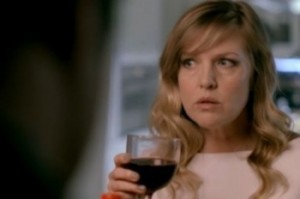
But Catastrophe is not the first public service commissioned comedy to take up this transatlantic space and there have been other distinctly transatlantic comedies commissioned and developed by British public service broadcasters. While arguably very British in its domestic familial setting, BBC commissioned sitcom Cuckoo (2012 – 2014), had a distinctly transatlantic cast, starring English comic and actor Greg Daniels as father Ken and American actor and former Saturday Night Live cast member Andy Samberg, now star of Fox comedy Brooklyn Nine-Nine (FOX, 2013 – ), as the hippy, would-be son-in-law Cuckoo. On Samberg’s departure he was quite amazingly replaced by American film star of the inordinately successful Twilight films, Taylor Lautner and Ken’s wife Lorna is played by Helen Baxendale, starring on both sides of the Atlantic in award-winning comedies Cold Feet (BBC, 1997 – 2003) and Friends (NBC, 1994 – 2004).
First broadcast on Showtime in the US and on BBC Two in the UK within two days of each other, Episodes, starring Tamsin Greig, Stephen Mangan and Matt Le Blanc tells the story of a British writing duo, who are also a couple, moving to LA to write a television series. The show was created by Friendsco-creator David Crane and his partner Jeffrey Klarik.
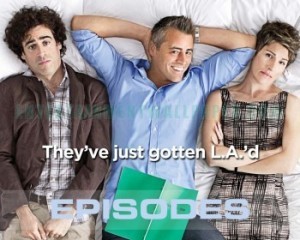
Despite dwindling ratings in the UK, the show has gained award success in the States with Matt Le Blanc winning Best Actor in a Comedy or Musical and the show being given a fifth series. But while there is evidence, in this instance at least, that audiences still show different viewing habits, the ongoing co-production still invites an understanding that there is a production space that is neither wholly British or wholly American and this is one that British public service broadcasters are increasingly bringing into their schedules.
While it has been sufficient and useful to comment on the aesthetics of HBO comedies and their claims to quality television production, the introduction of Sky Atlantic and its range of new comedies starring US and UK talent in high budget, high concept, ensemble cast programmes suggests that this transatlantic space represents the moniker of original programming that Sky’s recent investment in content production has sought. Bringing together talent as far flung in terms of television traditions as Robe Lowe and Pauline Quirke on You Me and the Apocalypse (Sky 1, 2015), not only is the programme production itself representative of this quality comedy category, but the American and British talent, on screen and off, is an evident and consistent component.
It is my argument that this element of the construction of quality around these comedies exists in an extra textual space and a knowingness of extra textual information on the part of the viewer as they position themselves as an elite comedy consumer. As such, the self-awareness, irony and realist elements of these comedies extend beyond the aesthetics and content, and into a conceptual space wherein the audience member is invited to consider themselves knowing not only of British or American comedies, but both, as they exist increasingly either in tandem or in a common, shared category of quality.
So as Catastrophe continues to be heralded on terrestrial British television, as well as reaching American audiences via Amazon Prime’s streaming service, the mockumentary and realist styles of contemporary quality comedy might be toned down in terms of its aesthetics, but the show’s tranatlanticism sits front and centre not only in the text itself but in the surrounding celebratory rhetoric.
As a final thought then, while this space is one where quality television comedy resides, it is not the only space wherein British television comedy is positioned. Given the criticism of more traditional studio based sitcoms such as Mrs Browns Boys and Miranda, for being too old fashioned and out of date, is British comedy losing its claims to public service in a bizarre twist towards the commercial American framework? Or, is the public service site of Catastrophe’s commission, an indication that public service can do quality and by using the legitimacy provided by transatlanticism not compromise on the broadness of appeal?
Erica Horton is in the final stages of completing her PhD thesis Luxury Items: Discourses of Cultural Value in Creating Channel 4 Comedy, which focuses on comedy as a public service television genre and the implications for distinctions of creative worth in compartmentalising comedy formats in departmental categories. She began studying comedy during a year abroad at San Francisco State University, for her BA in Film and American Studies with the University of East Anglia. This interest was pursued in her Masters dissertation, ‘No Girls Allowed: Gender Politics in the Contemporary Film Comedy of Judd Apatow and the Frat Pack’. Horton is now pursusing further research and teaching positions with the aim of continuing her studies in film and television comedy within broader debates around creativity and cultural value.


